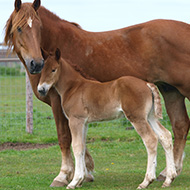Jimmy's Farm welcomes rare Suffolk Punch foals

There are fewer than 500 purebred Suffolk Punch horses registered in the UK.
Jimmy's Farm and Wildlife Park has announced that it has welcomed two rare Suffolk Punch foals.
The oldest English breed of working horse, the Suffolk Punch is a short and stocky horse and is listed as critical by the UK Rare Breeds Survival Trust.
Annie and Annabelle, two Suffolk Punches who live at Jimmy's Farm, have given birth to a foal each, the organisation reveals.
Both horses moved temporarily to the Suffolk Punch Trust to have their foals, and will return to the farm once mares and foals are all ready.
Jimmy Doherty, founder and owner of Jimmy's Farm, commented: “I’m delighted at the arrival of both foals.
“When the Suffolk Horse Society asked if we would be able to contribute to this breeding project by hosting the two mares, we were over the moon and jumped at the chance. We are elated with these two beautiful foals; the result of two successful pregnancies.
“The Suffolk Horse is an irreplaceable feature of our local heritage here in Suffolk and these foals will help strengthen the population.”
Annabelle's colt was born on 9 May, while Annie's filly was born on 14 May. The arrival of both has been cause for great celebration, particularly for the filly, as the birth of new females is deeply important for breed population.
Tracey Pettitt, from the Suffolk Punch Trust, led the team, and said: “I feel privileged to see the foals be born and honoured that Jimmy’s Farm & Wildlife Park trusted us to do the job.
“The mares are both healthy and have taken to motherhood like ducks to the water. This is the first time we’ve had two mares foal side by side.
“Annie and Annabelle were born on the same day and have spent every day together since, they’re practically sisters.”



 The Federation of Independent Veterinary Practices (FIVP) has announced a third season of its podcast, Practice Matters.
The Federation of Independent Veterinary Practices (FIVP) has announced a third season of its podcast, Practice Matters.